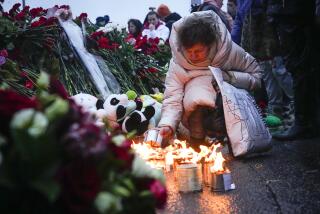‘Are these people godless?’ Putin asks as Russian protesters denounce cathedral plans
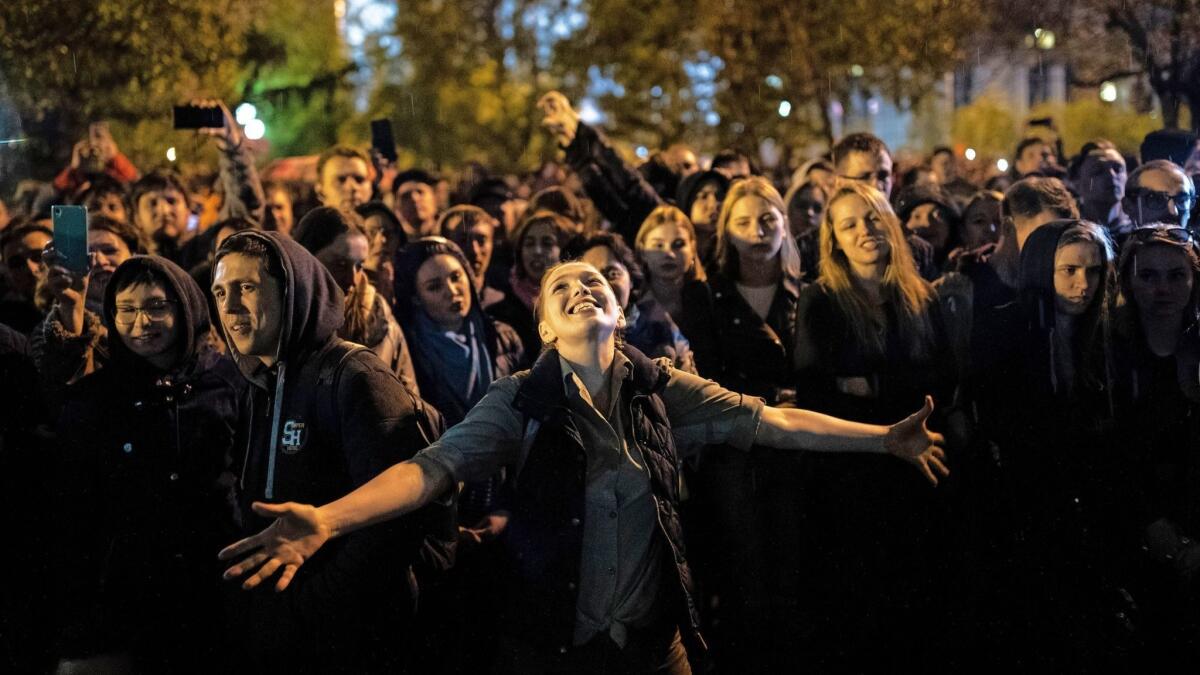
Reporting from Yekaterinburg, Russia — When authorities erected a chain-link fence around a waterfront park in central Yekaterinburg last week, residents vehemently opposed to the Russian Orthodox cathedral slated to be built in one of this city’s few green spaces were enraged.
Hundreds turned out to protest the project, which is being financed by two local oligarchs with the blessings of the regional government. Demonstrators tore the fence apart and tossed pieces of it into the pond, a focal point in Yekaterinburg’s historic city center. Police clashed with protesters. Dozens were detained.
The protests and clashes grew daily, until thousands gathered, and the entire country took notice.
On Day 4, Russian President Vladimir Putin weighed in. “Are these people godless?” he said in televised remarks. “A church should unite people, not tear them apart.” Putin suggested that the local government should conduct a public opinion survey on the project.
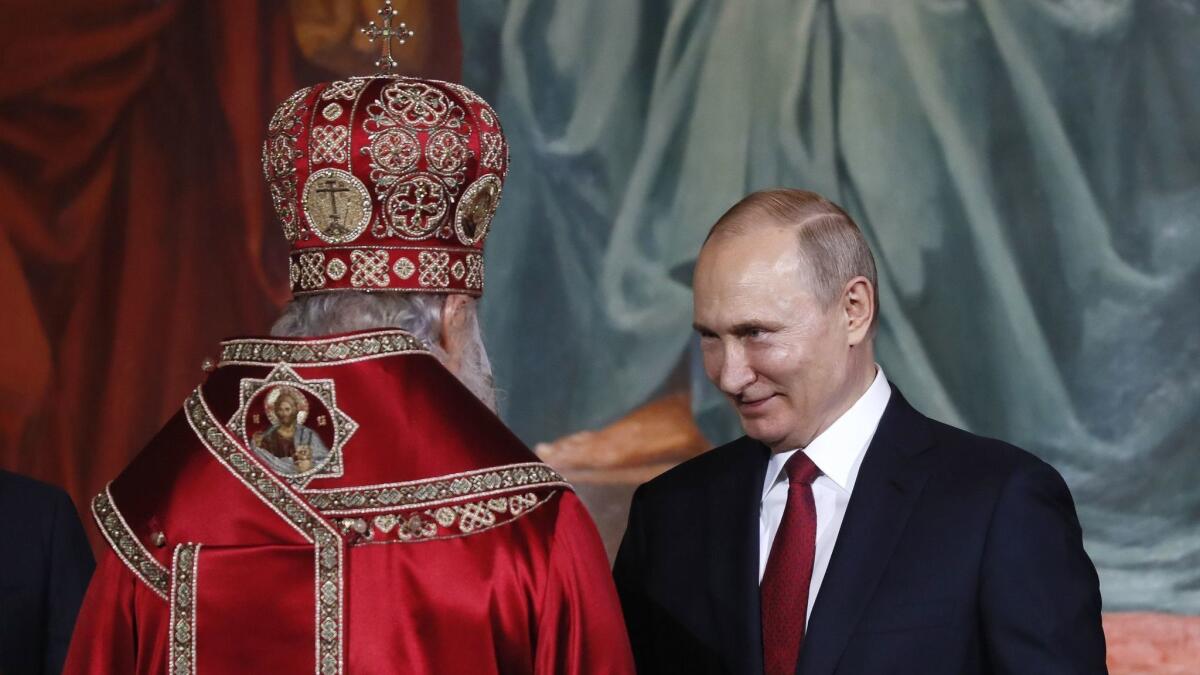
The regional governor agreed. Construction has been suspended until the poll results are in.
Yekaterinburg’s week of spontaneous protests is the latest example of what happens in Russia when the Kremlin comes up against a civic consciousness outside its control.
Protests in Russia are not unusual, but under Putin’s authoritarian, 19-year rule, they have been either strictly contained or harshly suppressed.
In 2011 and 2012, the Kremlin watched as tens of thousands took to the streets to demonstrate against what they believed were falsified election results. Dozens were arrested, and many were sentenced to prison for five years. Since then, Russian police have cracked down on unsanctioned public demonstrations with a political bent, particularly those organized by Alexei Navalny, a fierce Putin critic who has managed to draw thousands to anti-government street protests across the country.
“It’s not a secret that protests are almost prohibited in this country,” said Yulia Malkova, 26, who had stood with other protesters in the square next to the fenced-in park. The protests began not because people were anti-religion, as Putin suggested, she said. “We were against the church being built there, in that exact place.”
By the second day, the protests in Yekaterinburg had become about something else. “Now it’s about people showing that they still have a voice, and the government needs to listen,” Malkova said.
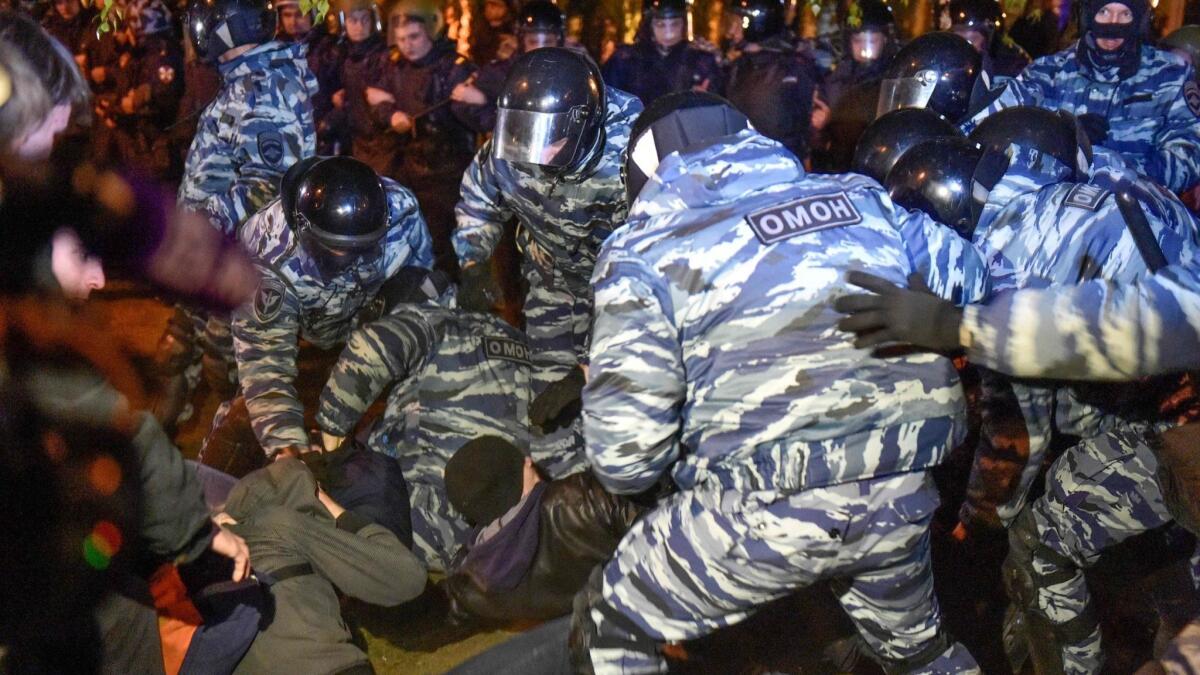
What’s happening in Yekaterinburg, which is in the Ural Mountains, is similar to protests seen in other cities across Russia since March 2018, when Putin was reelected in a landslide for a fourth term.
Immediately following the election, the Kremlin quickly introduced several unpopular reforms, including a rise in the pension eligibility age and tax increases. These difficult reforms came at a time when Western sanctions and low oil prices were hurting Russia’s economic growth. Russians’ real incomes are decreasing, while prices are increasing.
Putin’s approval rating, which soared to more than 80% after Russia annexed Crimea in 2014, dropped swiftly after the reforms were announced. Just 33% of respondents in a recent survey said they trusted him. In September regional elections, Kremlin candidates lost three governor’s seats across the country’s 49 regions.
It was a blow to the Kremlin, which has worked hard to paint Putin as the trustworthy father of the nation, who can solve all the country’s problems with one command.
Frustrated with the reforms and a decline in living standards, protests sprang up across the country to demonstrate against the pension reforms, overflowing landfills and declining living standards.
In Arkhangelsk, demonstrators rallied against Moscow’s plan to export its trash to landfills outside the northern city. In Volokolamsk, a Moscow suburb, protesters demanded the closure of a landfill leaking an acrid smell that was blamed for sickening dozens of schoolchildren.
In small cities and towns, residents demonstrated against the lack of medical care as the government shut down state hospitals in rural areas.
“These types of protests have come quickly and unexpectedly to the Kremlin authorities,” said Sergei Moshkin, a political analyst in Yekaterinburg.
On the second day of the Yekaterinburg protests, some demonstrators held signs demanding the resignation of the mayor, as well as the governor of the Sverdlovsk region, of which Yekaterinburg is the administrative capital.
The protests, which started as a civil action to protect green spaces, turned political. People were upset about the harsh response from the police and the regional government’s lack of response to public opinion, Moshkin said.
“The Kremlin sees this mistrust of regional leaders as a reflection of its relationship with the people, and that’s worrying to them,” Moshkin said. The signs were about regional leaders, but in Russia, regional leaders, including governors, are approved by the Kremlin.
Other protesters say the government was trying to appease the oligarchs, who want to build churches and put their names on them at a time when the Kremlin is pushing closer relations with the Russian Orthodox Church.
The proposed construction for St. Catherine’s Cathedral was intended to be completed in time for the city’s 300th anniversary in 2023. Plans call for a replica of an 18th century cathedral dedicated to Empress Catherine I. The atheist Soviet government demolished the original cathedral in 1930.
“All this gigantic church building, which is an incredible spending of resources, has taken place in a country where schools, hospitals and kindergartens are collapsing,” wrote Yulia Latynina, a popular Russian columnist, in Novaya Gazeta, one of the country’s few remaining independent newspapers. “The churches are empty. In the hospitals, the halls are choking in queues.”
The Yekaterinburg protests were different from the other protests around Russia because they were spontaneous and lacked a central leader.The protesters were a diverse group of people from different social and economic classes: skateboarders, moms with children, middle-class businessmen, pensioners.
“Russian authorities just cannot believe that people, on their own free will, would go out and protest,” Moshkin said. Inevitably, the authorities turn to conspiracy theories, he said.
There’s a museum in Russia honoring Boris Yeltsin. Team Putin doesn’t like it »
By the fifth day of protest, the demonstrations had taken on a different feel. At night, local priests and supporters of the cathedral came out alongside the proponents of keeping the park as is. The two sides politely argued their points of view. Hipsters played guitars. Someone planted a few small bushes. They stayed late into the night as the full moon illuminated the crowd and bounced light off the pond.
“It’s not just going to be a church, it’s going to be a cathedral, the most beautiful in the Ural Mountains,” Maxim Minyailo told a skeptical group on Saturday night, the sixth night people had gathered in the park. Minyailo is the senior priest at the Church on the Blood, which was built in 2003 on the spot where Czar Nicholas II and his family were murdered on July 17, 1918, by the Bolsheviks during the Russian Revolution.
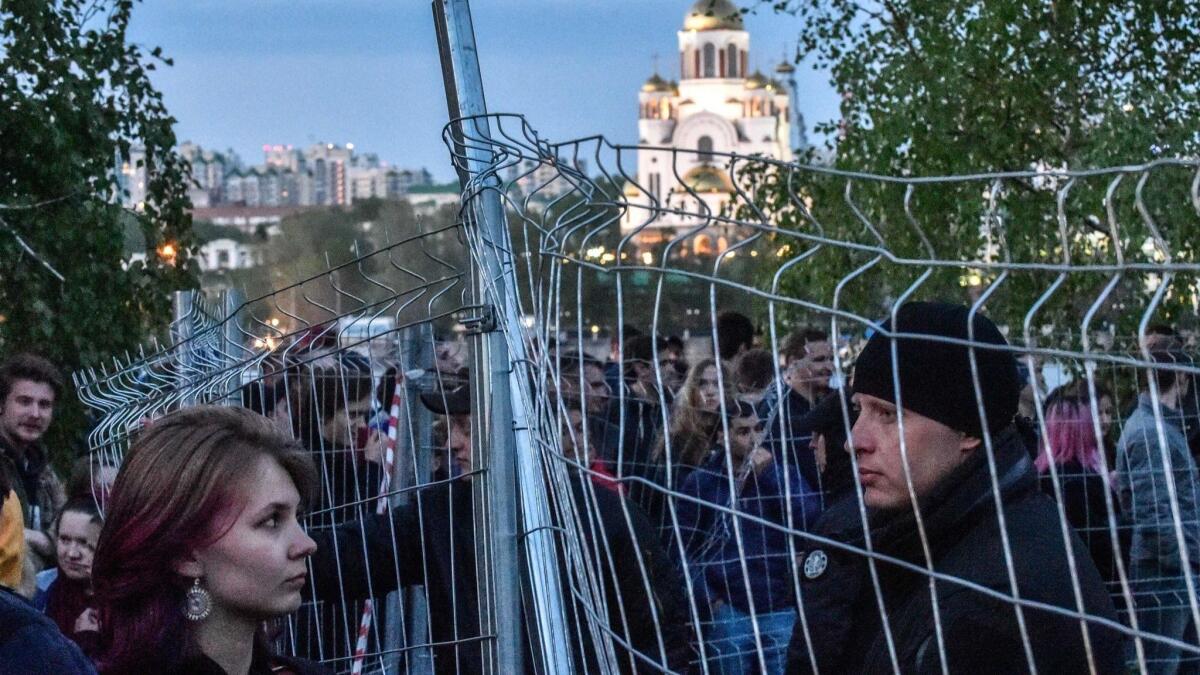
Putin’s weigh-in on the issue calmed tensions, but it sparked another debate. Many opponents of the cathedral project said they wanted a legal, binding referendum on the issue, not a public opinion survey. Five days after the protests started, the regional governor announced that a public survey would be conducted, and the city would have the opportunity to choose from alternative spaces for the church.
Despite what seemed like a small victory, many said they had little faith that the government would change the construction project’s plans.
“I think they will build it here anyway,” said Evgeniya Kuznetsova, 29, a law teacher. “But I’m so proud of what my city has done. I think we could be an example for all of Russia.”
As a teacher of constitutional law, Kuznetsova said she’s been thinking a lot lately about civil society in Russia, the relationship between people and the state, and whether changes — real changes — were taking place in the country.
Russia has a long history of authoritative rulers, from the czars to the Soviet Union and now Putin. And it doesn’t look like Putin is going away anytime soon, she said.
But maybe the future of Russia’s civil society was starting right here in Yekaterinburg, and the government will have to deal with the consequences, Kuznetsova said.
Ayres is a special correspondent.
Twitter: @sabraayres
More to Read
Sign up for Essential California
The most important California stories and recommendations in your inbox every morning.
You may occasionally receive promotional content from the Los Angeles Times.

